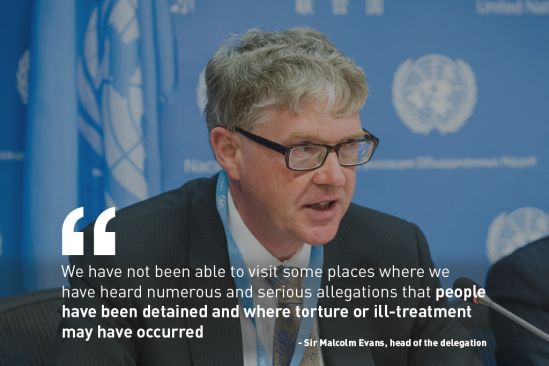“This denial of access is in breach of Ukraine’s obligations as a State party to the Optional Protocol to the Convention against Torture,” said Sir Malcolm Evans, head of the four-member delegation. “It has meant that we have not been able to visit some places where we have heard numerous and serious allegations that people have been detained and where torture or ill-treatment may have occurred.”
HRHN highlighted systemic problems relating to torture in Ukraine in its recent report submitted to the UN Committee against Torture. The report identified the classification of “torture” as a serious problem in Ukraine, asserting that in the majority of cases the conduct of law enforcement personnel is not classified as “torture” or ill treatment, but as abuse of power or official position, and that through this unclear classification the Ukrainian State maintains tolerance to torture.
The report also details a lack of initiative by the Ukrainian government to prevent ill-treatment and torture in facilities handled by Ukraine’s security forces, and reports that the authorities have not sufficiently implemented the recommendations made by the UN Committee Against Torture (CAT).
“This cancellation suggests that Ukraine is unwilling to fully cooperate with the international community on human rights,” responded Florian Irminger, Head of Advocacy at HRHN. After Euromaidan, the annexation of Crimea, and the conflict in the East, one would expect the government in Kyiv to fully cooperate with such mechanisms – in order to build a Ukraine committed to human rights and universal values. Ukraine must really choose the side of full cooperation with international and regional human rights mechanisms.”
“We cannot accept that State authorities are in any way interfering or picking and choosing which facilities can be visited by the SPT,” continued Irminger. “This is now true in Ukraine, just as it was sadly true when the SPT was forced to cancel its visit to Azerbaijan in September 2014.”
The SPT delegation concluded that the integrity of the visit, which began on 19 May and was due to end on 26 May, had been compromised to such an extent that it had to suspend it, as the delegation could not fully carry out the SPT mandate.
HRHN has received reports of Ukrainian MPs, the Ombudsman, and members of the government reacting negatively to this development. HRHN welcomes their response and that these officials have spoken out on this issue.
Documents:
- HRHF CAT Report on Ukraine (May 2016)
In May 2016, HRHF submitted this follow-up report to the review of Ukraine by the Committee Against Torture (CAT).
Mandate of UN Subcommittee on Prevention of Torture
The Optional Protocol on the Prevention of Torture (OPCAT) has to date been ratified by 81 countries.
Under OPCAT, the UN Subcommittee on Prevention of Torture (SPT) is mandated to visit all States parties and can make unannounced visits to any places of detention. This is only the second time the SPT has halted a mission – such suspensions are made in cases where a lack of cooperation by the State party prevents the SPT from fulfilling its OPCAT-mandated duties.
SPT communicates its recommendations and observations to the State by means of a confidential report, and if necessary to National Preventive Mechanisms. However, State parties are encouraged to request that the SPT makes these reports public. The SPT is composed of 25 independent and impartial experts from different regions of the world.





